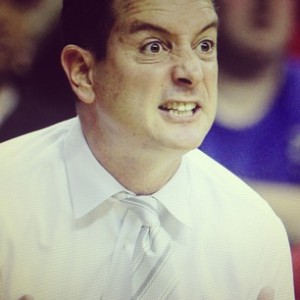CNN Says It is Wrong to Fire Bullying Coach?
 In an opinion piece on CNN.com. writer Roxanne Jones makes the argument that former Rutgers University Head College Basketball Coach Mike Rice should not have been fired for his bullying coaching style.
In an opinion piece on CNN.com. writer Roxanne Jones makes the argument that former Rutgers University Head College Basketball Coach Mike Rice should not have been fired for his bullying coaching style.
Rice was recently fired as the head coach – and the former athletic director was also removed from his position – when video footage of Rice bullying his players during practice, to include using homophobic slurs, kicks to the rear end, bouncing balls off of players and berating them verbally was released to the public.
Jones, who is black, makes the argument that this coaching style has been around in all ages and levels of sports for decades, made most famous by people like Bobby Knight and P.J. Carlisemo. She goes on to talk about how her son had one bullying coach when he was playing AAU basketball as a child. She said that her son was one of the all-black basketball team and the coach treated them harshly.
The coach would say they were all going to grow up and wind up in prison or dead; he yelled that if it wasn't for basketball, they would have nothing. The fact was that all the boys on the team were from good homes, privately educated and destined for college, but the coach treated them like criminals. Jones said that either she or her husband always watched practices, just to keep an eye on things and prevent them from "getting out of hand". To top it off, the team was terrible; it lost every game of the season.
Just reading that far makes you say, "Is she nuts? I would pull my kid in a New York Minute! What is she thinking, what about the damage to her son…"
Interestingly, Jones – who was working for ESPN at the time of her story – had access and friends in the NBA. She asked one of the players if she should pull her son from the team to protect him from the bullying coach and all the losing the team was doing.
The player said, "Absolutely not. Your son has to learn to play for the love of the game. Whether or not he likes the coaches he plays for doesn't matter."
The player further went on to share with Jones that learning to play – and still love the game regardless of the coach – would serve him later in life. The player shared that he had gone through similar circumstances growing up and playing for the bullying coaches and playing through the dislike of the coaching style had served his as an adult, allowing him to still love and play the game when faced with circumstances or people he didn't like.
Isn't that interesting? Much like I said in the latest radio interview and wrote in the book, "Bullies Suck", the player shared the same sentiment that I do; bullying is going to happen in life and you need to learn how to deal with it. What makes this story so interesting is the context of sports.
In sports, which is similar to relationships, it is voluntary. No one made you join the team or made you get into a relationship with someone. You volunteered. You said you wanted to do this, so you signed up. Now you are faced with a situation where you are a member of a team, supposedly one unit that depends upon each member to do their job and to succeed, and you have a coach that is basically a negative reinforcer/bully. How would you take back your power in this instance?
Standing up to the coach would be one way. Either privately (best way) or publicly and demanding you are treated like a normal human being. But – another way, which is the way the NBA player referenced – would be to continue to play and NOT let the coach or losing take away your love of the game. You could make the decision in your head that you are going to play and enjoy the game or activity and you are not going to let one person bother you, get to you or take away your passion. This was highlighted in the article when Jones referenced a former player of Rice's who stated, "Yes, he went overboard. But you can't get a good feeling of what went down by highlights on ESPN. No one was scared of Coach Rice. We did not fear him. We just understood him."
While there are pitfalls and drawbacks to both methods, there are also strong points to both approaches. As adults and parents, we have to decide what approach and lesson we think would be best for ourselves and our kids.
Stay strong,
Sensei.
P.S. – I am getting many requests and phone calls about getting physical copies of the book. Physical copies of the book, "Bullies Suck" along with some bonuses that go with it are going to be released on Monday, April 8th. Supplies are limited, so stay tuned.



Follow Us!